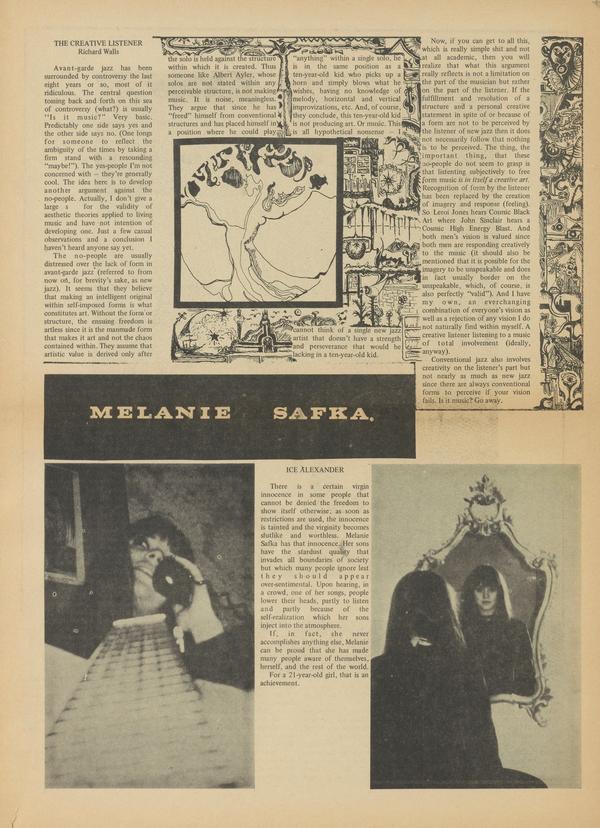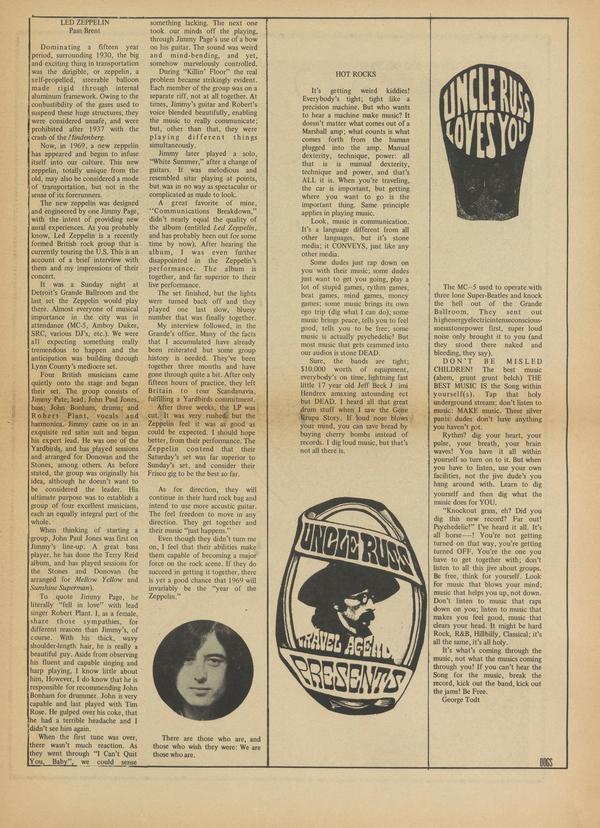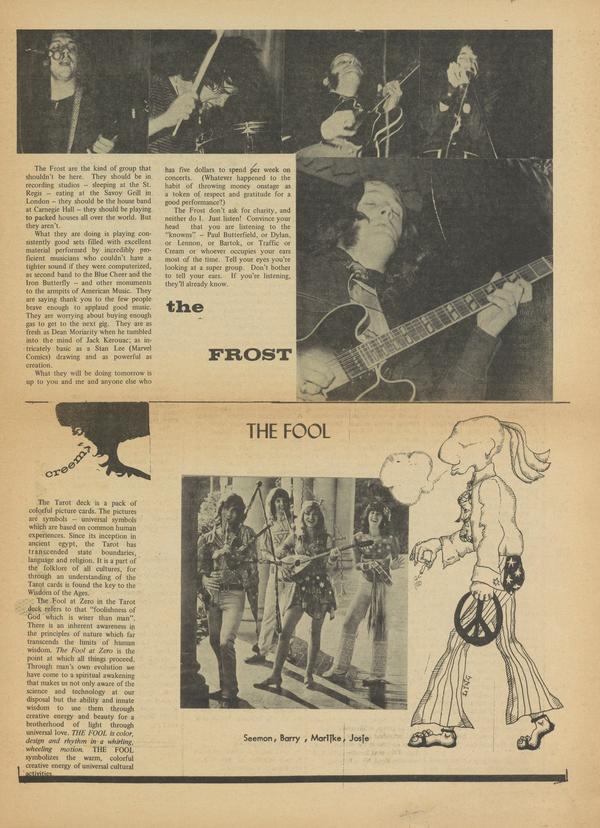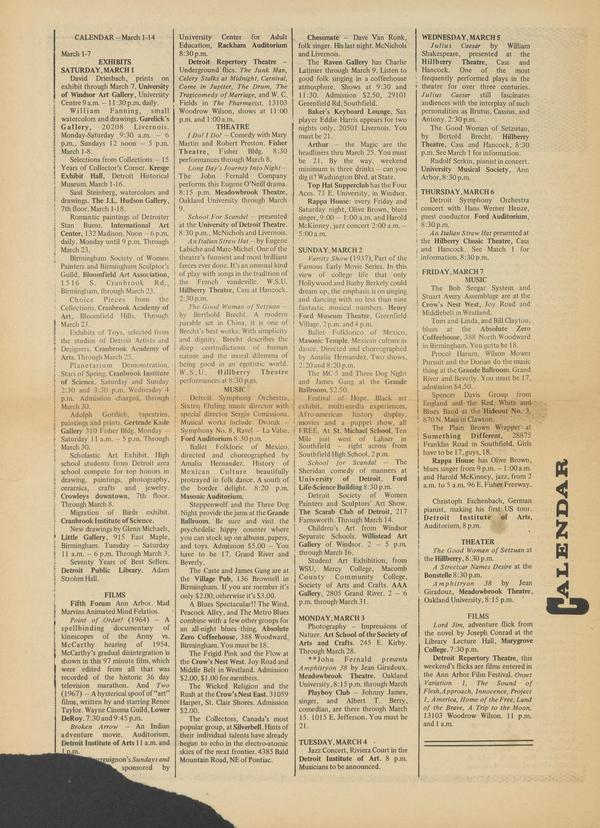MC-5: OBSCENE!!
Two of Detroit’s largest record merchandising outlets, the J. L. Hudson Co., and Ross Music Co., have refused to sell the Maniacal Motor City Five LP, calling it obscene. Ross Music did, however, cash in for a while by selling a censored version, having the Trans-Love statement expurgated with black ink — Caveat Emptor.


The CREEM Archive presents the magazine as originally created. Digital text has been scanned from its original print format and may contain formatting quirks and inconsistencies.
MC-5: OBSCENE!!
Two of Detroit’s largest record merchandising outlets, the J. L. Hudson Co., and Ross Music Co., have refused to sell the Maniacal Motor City Five LP, calling it obscene. Ross Music did, however, cash in for a while by selling a censored version, having the Trans-Love statement expurgated with black ink — Caveat Emptor.
THE WORLD OF ROCK Including Dozens of Photos of Top Recording Stars and Groups by John Gabree Book Review by Bob Stark
The people who buy rock records have a lot of money to spend (just look at how many of the top twenty albums on the charts are rock, and not just rock, but rock with pretensions of being “good” rock) and for many of them, their interest in the music goes far deeper than just something to listen to while driving to Ann Arbor.
There has almost from the beginning been a large market for publications dealing with rock — at first, fan magazines like 16, Go Magazine, and Rave, but now with Crawdaddy and Rolling Stone and Creem, the serious criticism of rock music has become a commercial reality. Now the time has come for books which at least have pretensions of presenting a serious analysis of srock music. But, pretensions are about all that The World of Rock has.
Gabree seems to have earned his credentials as a rock expert on the basis of a very negative article on the Beatles in Cheetah magazine last winter. This article had originally been published in Downbeat, and had received so much negative response that Gabree almost totally changed the point of focus from Sgt. Pepper in the Downbeat version to Magical Mystery Tour, in Cheetah. Even with these changes, the negative response was tremendous, and Robert Christian, who was then Cheetah’s film critic and has since become Esquire’s pop music critic, wrote an answer which appeared two issues later. The Beatles article is Chapter 1 of The World of Rock, and it’s easily the high point of the book.
From then on we find “dozens of photos,” an accurate, but far too incomplete to be interesting, history of rock, with phrases, sentences and whole paragraphs quoted (with permission but without specific credit) directly from reviews that appeared in Eye, Downbeat, and Pop Scene Syndicate. After advancing the idea that the music was far more important that the number of people who buy the record in cutting down the most popular group of all time, he even had some nasties to say about record companies who spend lots of money promoting underground acts with limited sales appeal over groups like the Union Gap, who consistently make the charts.
There definitely exists a market for meaningful criticism of rock. Crawdaddy has gone over the deep end of intellectualism and has become extremely boring, and Rolling Stone has been focusing far more on the scene than on the music which is good, but leaves a definite gap. If someone were to write a book that filled this gap, it would be an instant best-seller. But when a writer, whatever his intentions, can’t decide whether he, or the people who read him are really the critics; and has to use other people’s lines, second rate photos, and a few hours of research to stretch an interesting article into a hype like The World of Rock, he deserves little attention for his opinions.
JETHRO TULL INTERVIEW Mich Jaggers
Jethro Tull consists of four people: Ian, flute, Clive, drums, Martin, guitar (incidently, this is a new guitarist—there has been a personnell change since the album was cut) and Glenn, bass.
Creem: Who or what is Jethro Tull, and why this for a name?
Ian: Jethro Tull was an English agriculturalist during the 18th century, you see, who had long hair and invented a seed drill—very clever bloke.
Glenn: He played organ as well.
Ian: Yeah, that’s right. He was a musician too. It wasn’t any of us—someone just started muttering Jethro Tull, Jethro Tull, in connection with us as sort of a joke, and it sort of just caught on to the point that we thought “that’s a nice name” and it is a nice name.
Creem: You’ve been together a year, right?
Ian: Yeah, that’s right.
Creem: How are you accepted in England?
Ian: Well, we had the honor of / doing a residence at the Marque Club in London, so people got used to us and started liking us. The acceptance over here has been much the same over here. People from all parts of London come down and drop in the Marque, so this helped a lot. A lot of people have seen us in London before we’ve come to their home town. While over here we’re doing a concert for only one time and there will be a bit of time before they hear us again, so it is hard to convert some thousand people at one listening to liking you. The only thing they have if they like something is to go out and buy the album. It’s pretty hard to try and make them accept you. You don’t want to commercialize it or make it blantently obvious that you want public acceptance.
Creem: It sees people get the idea that you’re jazz inclined. Are you?
Ian: No, not at all, ‘cus none of us know anything about jazz. Oh, we’ve listened to an odd thing here and there, but none of us make any effort to lean toward it. Gary Burton in Melody Maker reviewed a track off the album (This Was) and said these people sound as if they have jazz experience which gave us all a laugh because none of us know anything at all. None of us really have any likes or dislikes in music— we play things we’ve liked since the age of twelve on up without actually saying I want to be a rock and roll guitarist or blues singer. You don’t worry about it—you just play the way you want to play, and that’s what we do—we just get away with doing what we want.
Creem: Anything to say about politics or the youth movement or anything?
Ian: We have nothing to say about your politics, but it worries me to see a very weird thing going on with young people today. They seem to be getting wound up in something they don’t understand. They don’t realize how narrowminded they are themselves. If they could only see themselves as other people see them, they wouldn’t think it so much fun. It really worried me to play last night at the Grande to see people smoking
pot and lying on the floor with women, in various states of sexual agitation which as far as I’m concerned, this is a private matter. As far as I’m concerned, smoking pot or lying about the floor with women is gross indecency. It offends me intensely. I know I am damned if I think I should get up on stage and entertain somebody who thinks that its incidental music while they grind on the floor together or something. I find it very annoying.
Ian: While a lot of music stems from those things (sex and drugs) —well, it does from the sex thing, I don’t think any good music from the drug thing—it’s a first-rate joke. If I ever go to listen to a group, I don’t think I’d even take a girl with me. I just gotta listen and sit down and listen. After having that, I would get up and leave, quietly and feel I’d got my money’s worth. I don’t people know what they’re there (the Grande) for.
Creem: Don’t have their program together, right?
Ian: Well, yeah, but still if that’s their way of enjoying themselves, you know. I suppose they deserve a couple of years to find out what is the right thing. I don’t think doing those things (smoking pot and balling on the Ballroom floor) are the right things. It’s nice to see people enjoying what you do.
Creem: Then you don’t have any message to get across like some groups around. More of less saying sit back, listen and dig us if you can.
Ian: Yeah, that’s right. If you enjoy it, then say no more about it. Don’t analyse the situation too clincaly and decide what’s good or bad. If it’s OK, it’s OK. If you feel you’ve achieved something by seeing a group, then by all means go. We’re not doing a John May all or a blues crusade, or pushing something we fervently believe, ‘cus we don’t believe too passionately too much of anything or in anything.
We then talked about loudness for a while, of groups, that is. We talked about the Nice’s dummy incident. They did it in a serious way—they weren’t nasty about it. The Nice, I found in Ian’s opinion, are good musicians.
Ian: I haven’t seen nor heard of any American groups who come anywhere near the standards of musicianchip they have reached. Particularity the organist Keith Emerson.
We compared Love Sculpture’s guitarist to Mike Bloomfield (good, but monotonous, more or less).
Ian: He sounds like a very frustrated person—he has technical ability but he doesn’t know how to use it.
We talked about Super Session for a bit, and then it was time for them to split, so we closed the conversation.





